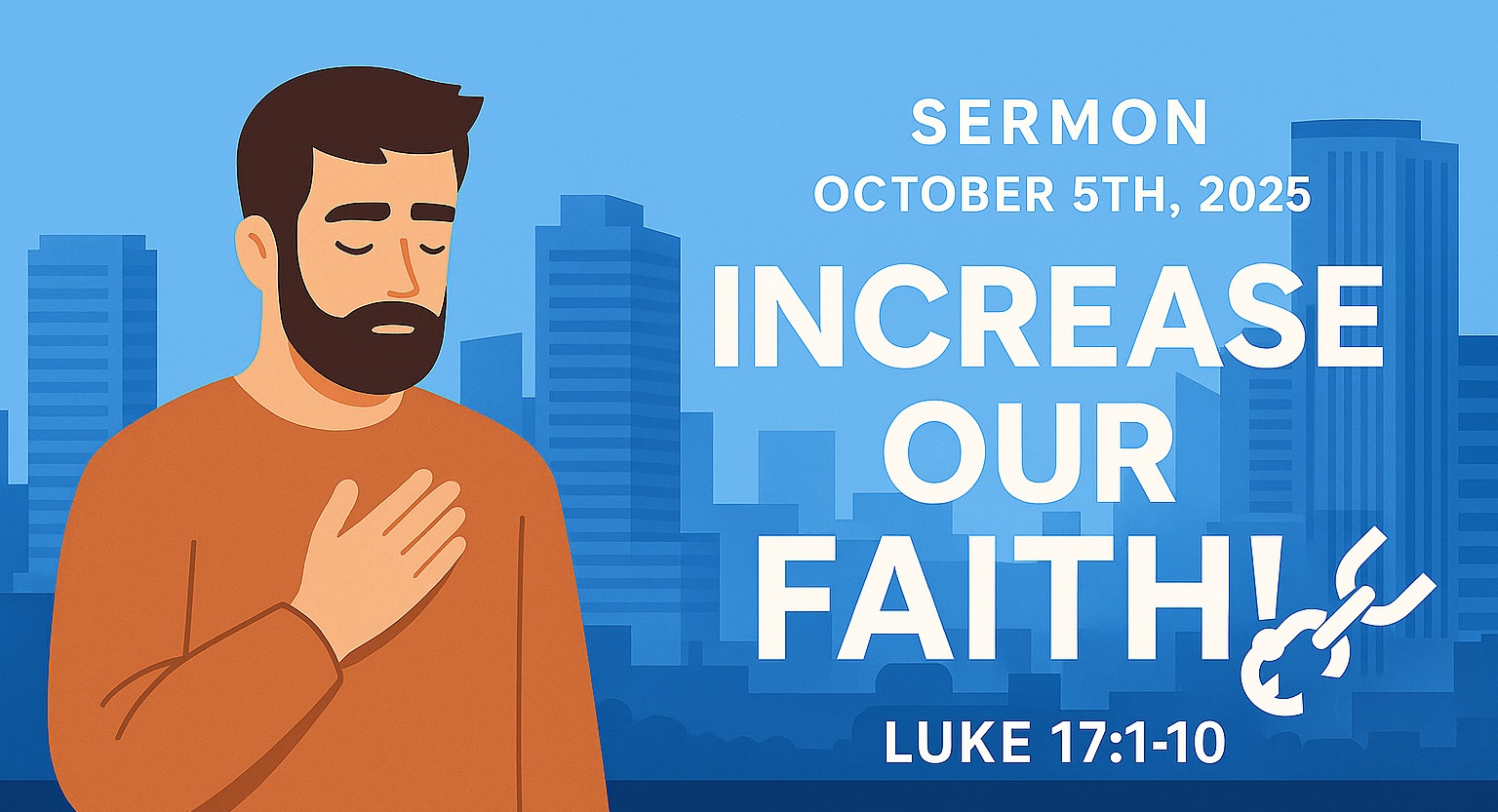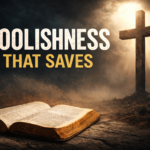
Text: Luke 17:1-10
Theme: “Increase our faith!”
___________________________
Intr – What is the rarest creature on the planet? Perhaps a turtle, a bird, an insect? Biologists and other professionals work every day to identify species at risk and to preserve them.
But I think the rarest creature on the planet is one that biologists hardly research: a human being who sincerely acknowledges he or she is wrong and asks forgiveness. Not for small things, but for real hurt. And I’m talking about real repentance—without excuses, without explanation, without resorting to the generic “I make mistakes just like anybody else.” To simply say: “I’m wrong. Please forgive me.” Period. No complements, no justifications. How rare that is!
The second rarest person is the one who forgives unconditionally. Because of sin, we have a hard time being that generous. We want fairness, vengeance, getting even.
I know I’m pushing the envelope here and exaggerating it. I know that as Christians you ask and give forgiveness—probably more often than you’d wish. What I want to highlight is how hard it can still be to practice these actions. Just because you go to work every day doesn’t mean the job gets easier every day, right? It’s the same with forgiveness. The need is constant, the practice is hard, and that’s exactly why we pray with the disciples: “Lord, increase our faith.”
Faith against Temptation
Jesus tells His disciples: “If your brother sins against you seven times in a day, and turns to you seven times saying, ‘I repent,’ you must forgive him.”
Seven times in one day? That’s too much for the Old Adam. We prefer the saying: “Fool me once, shame on you. Fool me twice, shame on me.” But seven times? That takes faith. Think about a challenging situation: perhaps a family member who consistently makes hurtful comments, or a coworker who repeatedly fails to pull their weight, causing you extra stress. To forgive not once, but seven times in a day for such hurts feels humanly impossible.
That’s why faith plays a central role here. Habakkuk says: “The righteous shall live by faith. “Paul writes to Timothy: “Faith without hypocrisy.” And Jesus says: “If you had faith..” But this is not about us measuring how much faith we have. Faith doesn’t measure itself. Faith clings to Christ. He is the one who strengthens and increases our faith for our daily struggle of forgiving and being forgiven.
Before I continue, it’s important to say: forgiveness does not mean giving someone a free pass in situations of abuse, trauma, or repeated sin without boundaries, or that people are free from human consequences of their actions. Jesus calls us to forgive, but He never calls us to enable evil. Scripture also teaches us to guard the faith, protect the community, and sometimes step away from unrepentant or destructive people (Romans 16:17). Forgiveness releases the grudge in our hearts, but it does not erase the need for wisdom, justice, or even distance when necessary.
But the central truth of the Gospel remains: forgiveness is a bottomless well. There is no end to the need for it, and no limit to the grace God gives us to extend it. Because it flows from Christ Himself, the source of living water for our hearts.
Faith to Forgive
Forgiveness can be rare and can be hard. And it comes with some misconceptions:
- We think we must forget in order to forgive. But that’s impossible. We have memories. Forgiveness is not brooding over things; it is touching a scar but not feeling the pain anymore.
- We think some sins are unforgivable. But those lists change with each generation or culture. God’s Word declares all forgiven in Christ.
- We think forgiveness makes us weak. But in truth, it takes the strength that only Jesus provides.
That’s why we need to pray with the disciples: “Lord, increase our faith!”
- Faith in Action
What Jesus asks us here is impossible for us to fulfill perfectly. This is why we resort to Him, whose forgiveness lavishes us 7, 70, 700 hundred times a day. He is the perfect forgiver who offers us this gift. A gift that we desire to give forward.
Forgiveness is both passive – comes from Jesus without merit on our part; and it is active – forgiveness is faith in action. In both cases, faith is central. Faith is the means that receives it, and faith is what propels us to act. Faith is not just an inner conviction—it lives, it acts, it forgives.
This is one of the core teachings of our Savior, Jesus Christ. He didn’t just teach it—He lived it perfectly, even forgiving those who nailed Him to the cross, where He won forgiveness, applied to all those who believe in Him. We can go against the grain of old sayings like, “If you can’t stand the heat, get out of the kitchen” or “Like it or lump it.” Because you are forgiven, you forgive. Because He gives you faith, you live by faith. He did. Perfectly.
Also, forgiveness is not made for payment. We don’t work “to be paid.” We work because everything is already paid. Jesus says: “We are unworthy servants; we have only done our duty.” That doesn’t mean God ignores our works. It means our works show the value of His grace in our lives.
Increase our faith. So that we can forgive and ask forgiveness. It is hard. It is rare sometimes. But it is worth it. It is worth it because when we forgive, we experience a profound sense of peace and freedom that Jesus gives, a release from the bitterness that binds us to what we need to leave behind.
When I think about this topic, I often recall this illustration that I share with you today: Imagine this. You’ve been offended by your next-door neighbor. The anger you feel toward him grows so strong that you can no longer stand living in the same the same street. So, you have decided to move to another city. You pack everything up and leave.
Now everything changes—the city, the house, the street. Your work, your friends, maybe your phone number. Even your favourite pizza place, your mechanic, your hairdresser. Virtually everything in your life is new.
Except for one thing: the hurt and the grudge. They move with you. They unpack with you. They settle into the new house right alongside you. In fact, sometimes they even get worse. Because unsolved grudges don’t go away by themselves. Hurt and grudge don’t disappear just because you try to ignore them.
Now imagine another picture. This time you choose not to move. You stay in the same house, in the same street, the same job. Same gas station, same mechanic, same pizza place, same coffee shop with the same group of friends. Outwardly, nothing has changed.
Except one thing: the hurt and the grudge. They’re gone. They began to fade as you worked at forgiving your neighbor—whether he admitted his fault or not, whether he asked for forgiveness or not. It wasn’t easy. It took prayer, time, and the strengthening that comes from God’s Word and Sacraments. But slowly, intentionally, you worked on forgiveness. Until one day the grudge simply moved out, forever.
Because that’s how hurt can really go away: forgiveness.
This is a constant exercise in faith. Forgiveness is not always the operating room—immediate removal of the grudge—but often the gym: daily, intentional work in God’s Word, in the Lord’s Supper, in the life of being a disciple. It involves daily, intentional work. It leads us to prayer those who have hurt us, regularly learning from boundless grace in Scripture, and seeking His strength through the sacraments to extend that same grace.
Conclusion – When grudge, regret and lack of forgiveness want to cause you to move, make the move before them. Leave your life exactly where it is. Forgive. Pray with the disciples; “Lord, increase our faith!”






